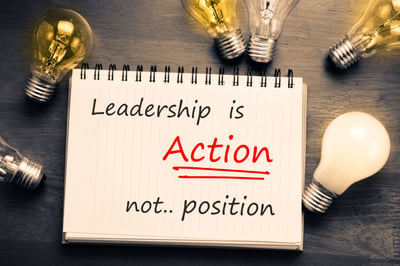 When people talk about the inner workings of organizations, we often use the word “leader” as a shortcut for “executive.” But the truth is, not all executives are leaders and not all leaders are executives. Anyone, no matter what their title or where they sit on the org chart, can demonstrate leadership and inspire others to achieve great things. Leadership is a set of skills and attitudes that can’t be attained by changing what it says on your business card.
When people talk about the inner workings of organizations, we often use the word “leader” as a shortcut for “executive.” But the truth is, not all executives are leaders and not all leaders are executives. Anyone, no matter what their title or where they sit on the org chart, can demonstrate leadership and inspire others to achieve great things. Leadership is a set of skills and attitudes that can’t be attained by changing what it says on your business card.
Although she may seem like an odd person to quote in a blog about leadership, we agree with the amazing Dolly Parton. She said,
“If your actions create a legacy that inspires others to dream more, learn more, do more, and become more, then, you are an excellent leader.”
So how do you strengthen your leadership skills? Here are some practical steps you can take whether you are the CEO or a front-line employee.
Assess Yourself Honestly
Just like when we set out to improve a process, the first step is to understand what is working well and what isn’t getting the expected results. The same is true for personal improvement. Pay attention to how you behave in different situations. Try to be objective and determine what attitudes and behaviors are your strengths and what needs to change.
Seek Continual Education
One trait that great leaders have in common is that they are avid readers. Whether you get information from books, blogs, podcasts, or peers, there are always new ideas or old ones that you haven’t yet uncovered. Seek information and inspiration from as many diverse sources as possible to expand your capacity to tackle challenges.
Welcome Feedback with Appreciation
True leaders understand that feedback is a gift. They surround themselves with trusted people who are willing to provide constructive criticism. Especially when it comes to interpersonal relationships and management style, direct feedback is the fastest way to learn what needs improvement.
Embrace Change
You can’t lead if you aren’t willing to move away from where you are. True leaders always seek improvement in themselves, the functions they manage, and the processes they operate. “The way we’ve always done it,” is the first thing to go when you seek to find a better way.
Set Goals and Work on them Daily
At work, it is very easy to get pulled into the emergency of the day or focus only on routine tasks and lose sight of your long-term goals. But leadership requires the ability to consistently work toward goals. A powerful daily practice is to do one small thing every day that will move you ever closer to your goals.
Ask for Support Often
The best leaders understand the benefits of having good advice and engaged advocates, and even the most experienced leaders often have a coach. Look for people who can serve as an unbiased sounding board to help you vet and improve your ideas. The Lean practice of Catchball is a good way to move ideas around from person to person seeking feedback and clarity.
Make It a Habit to Express Appreciation
Part of leadership is having the humility to recognize that you can’t accomplish what you want alone. Every success is the result of input from others in one way or another. If you take the time to recognize the contributions of others, you will encourage more collaboration and achieve even greater results. It is also important to appreciate the resources that you do have, rather than focusing on what you lack.
The Greek philosopher Aristotle put it this way,
“We are what we repeatedly do. Excellence, then, is not an act, but a habit.”
By incorporating these practices into your work every day, you will become a more competent leader. Whether that changes your roll or not, you’ll gain the trust of those you work with and improve the results of everyone around you.




Add a Comment